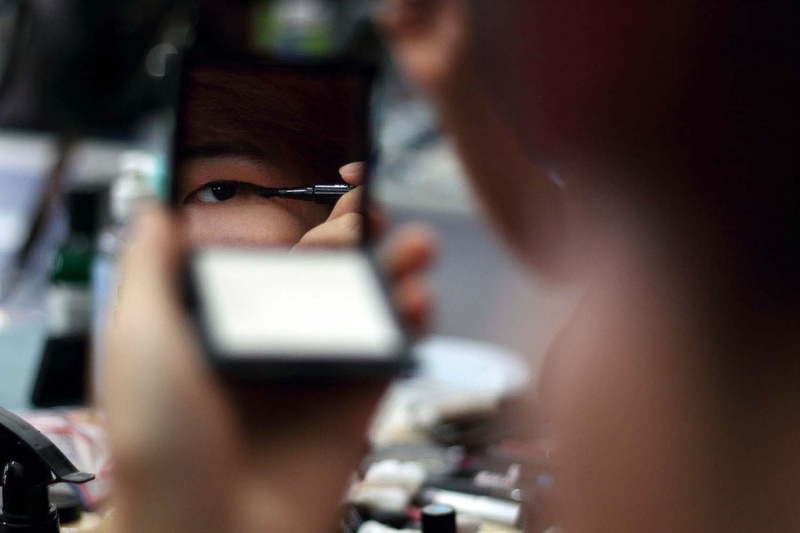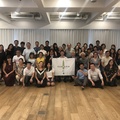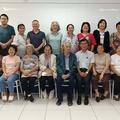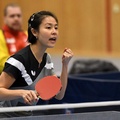According to the 2010 census conducted by IBGE (Brazilian Institute of Geography and Statistics), there are approximately 190 million people living in Brazil. Of these, approximately 1.5 million are Japanese or descendants of Japanese, or less than 1% of the country’s population, according to data from Japan’s Ministry of Foreign Affairs and the Center for Japanese-Brazilian Studies. In quantitative terms, therefore, the Nikkei is part of a minority.
According to an evaluation by the Brazilian Association of Gay, Lesbian, Bisexual, Transvestite and Transgender (Abglt), approximately 20 million Brazilians are homosexuals, corresponding to 10% of the population. This is another minority group.
By “minority”, it is not just about statistics; there is also a factor of ignorance and prejudice that, in one way or another, begins to be discussed in Brazilian society. In the case of homosexual Nikkei, then, it is a group that constitutes a minority within a minority.
In Brazil, the Nikkei still suffer some kind of prejudice, manifested mainly in the form of stereotypes. Consequently, Nikkei homosexuals may also be a target of it. “I think we have been given an extra burden of prejudice. I’ve heard several times that ‘I’ve never seen a gay jap’, which shows a lot of our invisibility and how people suppose that I am this or that due to my race,” says Aryel Murasaki, 29, occupational therapist and a fourth generation Japanese Brazilian (Yonsei).
However, for Ricardo Nakase, 33, Sansei, there is no such extra charge. “Even though, in general, Orientals homosexuals are very discreet. Many, fearful of society or even of the reaction of family members, do not assume it. This is not an exclusivity of the Orientals homosexuals. In general, prejudice comes in a more or less standardized order. Observing society as a whole, we can see that prejudice comes according to the degree of divergence or detachment from the ‘normality’ that is believed to be right. So if the person is gay, the first thing people will point out is this feature. If someone is gay and fat, they will first point out that he is gay and, in the background, that he is fat. Understanding the degree of prejudice of the society is very complex,” he says.
Another form of prejudice is fetishization, a subject that targets Nikkei hetero and homosexuals in a similar way. Yet, this prejudice also comes from non-Eastern descendant homosexuals.
“Within our physical traits and customs, which people have a very shallow knowledge, there is a mysticism, fascination and consequent fetishism. I have never been in a situation in which I was not seen as an exotic fetish, whether for an Asian or non-Asian. I realize that the Asian man or woman is seen as a fetish rather than as an individual. There were friends who came to me and said ‘introduce me some jap friend of yours’; until then, I did not even have Asian friends in Sao Paulo. Do you understand how prejudice is subtle, but it does not cease to exist? When I ask ‘why do you have all that interest for Asians?’, The answer is usually ‘oh, I do not know, I like it because it’s different’. Then I noticed that I am rarely seen as an individual; I am a stereotype for everyone’s eyes. I had partners who said about Asians being better or comments like ‘you don’t look Japanese’, that I am too voluptuous to be Japanese. It’s really complicated,” says Kiyomi, 26, a makeup artist, Sansei.
“I’ve been to dates when I felt like an object; the person already made assumptions about me, including about sexual preferences, and when I did not meet certain expectations, I heard things like ‘but aren’t you a jap?’” says Aryel Murasaki. “I have been dismissed by several people for being a descendant, often with phrases like ‘don’t like Orientals’. On the other hand, there were people who wanted to stay with me simply because I was an Oriental, because they had never been to or because they liked them. In many moments, I felt like an object. Today, I handle this in a better way, but before I got very upset.”
There are slang words that express some of these fetishes. In general, the term “yellow fever” is attributed to a non-oriental person who is attracted to Orientals, both homo and heterosexual. “Rice Queen” refers to a gay man who prefers Orientals. Both, depending on the situation, may have a pejorative meaning for the Asian side of the relationship.
Stereotypes against gay Nikkeis have an aggravating effect: an image of a man with delicate, effeminate features, soft skin, hairless and necessarily sexually passive is made, which does not always match reality.
“Ethnic issues cause a frisson. Always permeated by clichés and labels. I feel extremely objectified. [Non-Eastern homosexuals] think of us as ‘power bottoms’ and ill-endowed. Jokes are always a recurring motive of these stereotypes,” says Jan Kumagai, 23, student, Sansei.
Psychologist Flavio Murahara, 34, sansei, compares the prejudice among homosexuals to racism against Orientals in general. “It follows the same logical rules of the society, the ideal of male beauty to be white, tall etc. The Oriental enters as a subclass in this classification. Although I had experienced innumerable situations of different severities, I remember an specific former date who told a mutual friend that he was not satisfied with the fact that I, the Oriental, had ended the relationship, because he, the white person, that was supposed to decide the future of the relationship. At other situation, someone said to my partner at that time, with me present, that he should not be jealous because he was not attracted to Orientals. It is very strange in the sense that these are not phrases usually listened by white or even black people in the same situation, as it would sound extremely racist. So, I think there is racism against Oriental people that is totally accepted in Brazilian culture, it is a issue that goes beyond the prejudice suffered by homosexuals, something that must be discussed widerly”, Flavio states.
That question
How did you find out you are homosexual? - is a question that frequently figures in lists of those that “homosexuals are tired of hearing”. With a little clarification, it’s easy to see why it is unnapropriated.
“If you ask me, I would not be able to define an answer immediately. I have always been,” says Ricardo. “Now, if you ask how I have assumed myself as gay for the society, the answer will be different and you will have a story about acceptance, family conflict and prejudice.”
“I think ‘tired of listening’ is related to how often we listen it. I do not consider this an annoying question, but I know many people who do. So we repeat it over and over again during our lives, but people do not ask ‘how did you find out you were straight?’,” points out Aryel.
“In the case of LGBT people, this question often refers to the suffering of the ‘discovery’ of sexual orientation, such as doubts, fears and anguish. It’s very intimate. If we look at these ‘lists of questions’, most are usually biased or offensive. But they are questions that also exist in other minority communities, for example, with the physically disabled, when someone treats them as if they were children,” adds Ricardo.
Family
Family relationship is still a delicate point, a very personal one indeed. The decision to tell family members is often the beginning of a process of transformation.
“I decided to tell my family that I was homosexual because it was causing me so much suffering. I felt that I could not be who I really was, I made a lot of effort to disguise all the little things, not only hide what I did outside the house, even tried to control my gestures to not look feminine, invented stories, lied. I had a feeling that I was cornered, trapped, and at any moment someone could discover the truth and expose me. I was very scared. Being in the closet is a very bad feeling,” says Aryel.
“At first, I did not understand what was happening. First came the stage of the self-blame: ‘Why am I different?’, ‘What will people think?’, among many other doubts. At 18, I had my first involvement, and at that time I told my family. It was chaos,” recalls Ricardo. “Today I understand the side of everyone, especially my mother, whom I’m very attached to. After this first episode, there were some family problems, unrelated to my situation, which made me give up my life for a few years. When I came back to life, I got involved with another person. I was already much more self-assured and had already passed the acceptance phase. I took on my new relationship and, unlike the first time, I was very well accepted by my family. I do not deny that there were new dramas, doubts and embarrassing situations, but all these is part of one’s process of evolution.”
“The fear of coming out to my family was accompanied by many insecurities, mainly because I was economically dependent on my father. I was afraid of being expelled from home or living in such an unpleasant situation that cohabitation would no longer be possible. It was at this point in my life that I understood the importance of assuming my sexual orientation to my family, which was the need to be truthful, to be whole. Having to omit part of my life was something that bothered me too much,” says Flavio. “What enabled me to make this revelation was to discover this inner certainty that, regardless of my father’s reaction [Flavio’s mother died when he was a child], I would have the courage to face whatever the consequences might be. After telling him that I was gay, I realized that this should not be a question experienced only by the young person who lives all these prejudices, but the family also has to face it. My brothers also had to deal with the prejudice of other people. Two of my closest brothers tell about the daily life of how it is to tell other people that they have a gay brother. As if homosexuality was a ‘problem’ only of that youngster and not a social responsibility of the family that can also take on the task of deconstructing prejudices.”
“The outing has led me to learn a lot from Facebook groups, academic texts, other people’s reports, and other information about various LGBTQ+ issues that have given me enough insight to find myself,” says Jan.
“Within the Nikkei community, there is some ‘veiled acceptance’. Because it is a very discrete culture when it comes to private life, I did not suffer any kind of prejudice from my relatives. It’s that ’everyone knows, but no one comments’. I know that in part this is due to my personal commitment. When you respect yourself and respect people, there is no way others won’t accept as you are. Within my family, both on the paternal and maternal side, I was the first grandchild to graduate from a college and the only one to get involved in the activities within the Nikkei community,” continues Ricardo, whose job is bank clerk; he is also a singer and performs at many events in the Nikkei community.
“I have not lived with them [family members] for seven years. I have not yet told them I am bisexual; I feel it is an issue that is in the air, but everyone ignores it. I understand that it is comfortable for them that way, so I leave it that way. Homosexuality is like a ‘slap’, and not talking about it explicitly would be a softer one,” says Kiyomi. Among his closest relatives is his grandfather. “I have never spoken explicitly to him, because he wishes from the bottom of his heart that I am happy, and bisexuality is not an easy path. In every story, there is the moment when the protagonist needs to choose the right path, and that path is never easy.”
© 2017 Henrique Minatogawa






